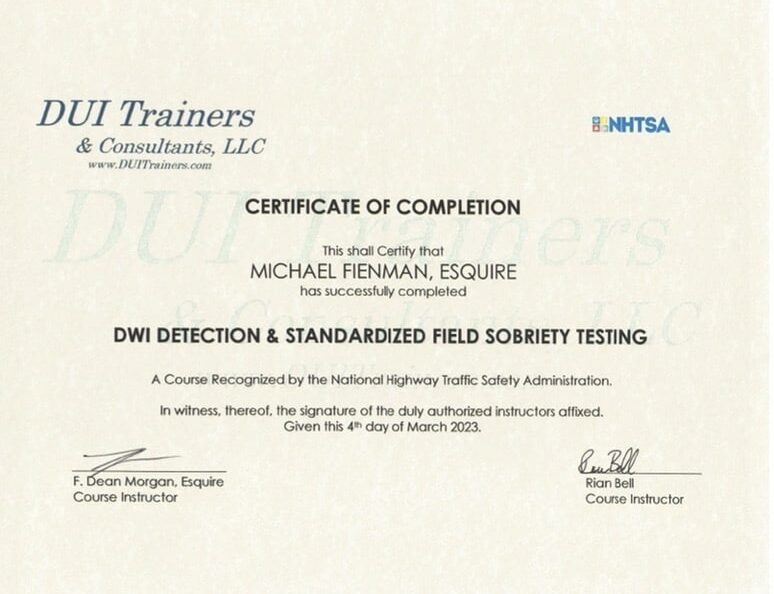Multiple DUIs in Philadelphia, PA
For individuals with multiple DUI convictions on their records, penalties increase significantly. A second DUI could result in the mandatory installation of an ignition interlock device at your expense, higher insurance rates, and possible job loss. As the consequences increase with each offense, it becomes crucial to have a skilled attorney to explore defense options and avoid the most severe outcomes.
At Fienman Defense, we have the skills and resources to defend repeat DUI cases effectively. We represent clients throughout Philadelphia, Bucks County, Montgomery County, Chester County, Delaware County, and beyond. Our approach leverages advanced training in field sobriety testing and DUI detection—similar to law enforcement officers’ training—to uncover weaknesses that other attorneys may miss.
Submit the details of your DUI & we’ll explain what’s next.
Pennsylvania’s DUI Look-Back Period
Pennsylvania has a 10-year look-back period for DUI offenses. This means that if you are charged with a DUI, any previous DUI convictions within the past 10 years will be considered when determining the severity of your penalties. If you have prior DUI offenses within this period, you will face harsher penalties as a repeat offender.
Tiers & Penalties for Repeat DUIs
Pennsylvania DUI law categorizes drunk driving penalties into three tiers based on BAC levels, and penalties increase significantly for repeat offenses:
First Tier (General Impairment: BAC .08 – .099)
- Second Offense: 5 days to 6 months in jail, $300 to $2,500 in fines, 1-year license suspension, ignition interlock for 1 year.
- Third Offense: 10 days to 2 years in prison, $500 to $5,000 in fines, 1-year license suspension, treatment programs, and ignition interlock for 1 year.
Second Tier (High Impairment: BAC .10 – .159)
- Second Offense: 30 days to 6 months in prison, $750 to $5,000 in fines, 1-year license suspension, alcohol highway safety school, treatment programs, and ignition interlock for 1 year.
- Third Offense: 90 days to 5 years in prison, $1,500 to $10,000 in fines, 18-month license suspension, treatment programs, and ignition interlock for 1 year.
Third Tier (Highest Impairment: BAC .16+ or Controlled Substances)
- Second Offense: 90 days to 5 years in prison, $1,500 to $10,000 in fines, 18-month license suspension, alcohol safety school, treatment programs, and ignition interlock for 1 year.
- Third Offense: 1 to 5 years in prison, $2,500 to $10,000 in fines, 18-month license suspension, treatment programs, and ignition interlock for 1 year.
Additional Consequences of a Repeat DUI
A repeat DUI conviction impacts more than just your legal standing:
- Criminal Record: A DUI conviction results in a permanent criminal record, which can hinder employment and housing opportunities.
- License Suspension: Multiple DUI convictions lead to longer license suspensions, making it challenging to maintain employment, meet personal obligations, and travel independently.
- Increased Insurance Rates: After multiple DUIs, many insurance companies may refuse coverage, or your premiums may skyrocket.
- Civil Liability: If someone is injured due to your impaired driving, you may face lawsuits in civil court.
Deanna’s Law: Enhanced Penalties for Multiple DUIs
Deanna’s Law, enacted in 2022, imposes stricter penalties for individuals with multiple DUI convictions:
- Third-Degree Felony: If you have two prior DUI offenses, a third DUI could be charged as a third-degree felony, carrying a maximum prison sentence of 7 years.
- Second-Degree Felony: A fourth DUI or more results in a second-degree felony, with consecutive sentences for each charge.
These heightened charges significantly impact sentencing, so it’s critical to have an attorney who can work to protect your interests.
What to Do if You’re Pulled Over for Another DUI?
Whether it’s your first offense or you have a prior DUI, if you’re pulled over on suspicion of impaired driving, remember:
- Do Not Self-Incriminate: Avoid discussing whether you’ve been drinking. Politely decline to answer questions and request to speak to your attorney.
- Stay Calm & Compliant: Cooperate with officers, provide requested documents, and avoid escalating the situation.
- You Have Options: Despite what an officer may tell you, there are ways to improve multiple DUI cases and minimize consequences. An experienced lawyer can assess your situation, build a defense, and guide you.
Defending Against Repeat DUI Charges in Philly
Facing repeat DUI charges in Philadelphia can be daunting, as prior convictions often limit leniency and alternative sentencing options. However, proactive treatment efforts and a strong defense strategy can make a significant difference. An experienced DUI attorney can advocate for your rights, challenge procedural errors, and emphasize your commitment to rehabilitation, working to reduce penalties and secure a more favorable outcome.
A skilled attorney will explore all potential defenses to mitigate the impact of a repeat DUI charge, including:
- Challenging the Legality of the Stop: If police lacked reasonable suspicion, the stop and any evidence gathered may be dismissed.
- Questioning Test Procedures: Testing equipment must be properly calibrated and maintained. Errors or mismanagement can lead to inaccurate BAC results.
- Disputing Test Administration: Field sobriety tests are often unreliable, especially under poor road conditions or if the individual has medical conditions.
- Highlighting Police Report Inaccuracies: Any contradictions or inaccuracies in the police report can weaken the prosecution’s case.
How a DUI Lawyer Helps with Multiple DUIs
Facing another DUI can be challenging, but a skilled attorney can protect your rights, minimize penalties, and work toward a favorable resolution even when previous convictions complicate your case.
Challenge the Evidence
An experienced attorney like Attorney Michael Fienman, with advanced training in DUI detection and standardized field sobriety testing, can meticulously review the evidence for any inconsistencies or procedural errors. This includes examining field sobriety and chemical tests, as well as any mistakes in law enforcement’s conduct. Identifying flaws in the evidence can greatly improve your chances, even with prior convictions on record.
Negotiating for Reduced Charges
Repeat DUI offenders often face harsher penalties, but negotiating with the prosecution can still yield opportunities for alternative sentencing. A skilled attorney can advocate for treatment programs and other options that focus on rehab rather than punishment. While leniency is limited, an experienced attorney can argue for these alternatives to reduce incarceration time and prevent further long-term impacts on your record.
Examine Every Detail
The details of your traffic stop, arrest, and subsequent procedures are crucial in any DUI defense. Attorney Fienman will scrutinize every aspect of your case, from the initial stop to how evidence was handled. With his specialized training in DUI detection, he can identify any potential violations of your rights that could weaken the prosecution’s case, potentially resulting in reduced charges or dismissal.
Minimize Harsh Penalties
While repeat offenses reduce some options, there are still ways to mitigate the impact of a DUI conviction. Pennsylvania law offers sentencing alternatives like alcohol treatment programs and ignition interlock devices that may reduce license suspension or jail time. A knowledgeable lawyer will assess your eligibility and work to achieve the most favorable outcome possible.
Why Choose Fienman Defense for Multiple DUI Charges?
Selecting the right lawyer is essential when facing subsequent DUIs. Attorney Michael Fienman offers unmatched skill, experience, and dedication to clients dealing with repeat DUI charges.
- Extensive Experience – Attorney Fienman has successfully represented clients with multiple DUI convictions in Philadelphia and surrounding areas. His knowledge of Pennsylvania’s DUI laws and repeat-offender penalties allows him to provide strategic guidance at each step.
- Advanced Training in DUI Detection & Field Sobriety Testing. – With NHTSA-approved training in DUI detection, Attorney Fienman can effectively challenge evidence that other attorneys may overlook, providing a sophisticated defense that leverages procedural knowledge and police standards.
- Client-Focused Approach – Attorney Fienman understands the stress of facing multiple DUIs and is committed to providing compassionate, personalized support. He works closely with each client to build a defense strategy that aligns with their unique needs and circumstances.
Standardized Field Sobriety Testing Certified
Pennsylvania DUI Law – Title 75, Chapter 38
Pennsylvania’s DUI laws, outlined under Title 75, Chapter 38, set strict guidelines for repeat DUI offenses:
- BAC Limits & Escalating Penalties: Each BAC tier comes with harsher penalties for repeat offenses, including longer jail terms and higher fines.
- Chemical Test Refusals: Refusing a chemical test leads to automatic license suspensions and harsher penalties for multiple offenders.
- Restricted Licenses and Programs: Programs like ARD may no longer be available, but alternative options like restricted licenses can help.
With extensive knowledge of these statutes, Attorney Fienman advocates for clients facing repeat DUI charges, providing effective, informed representation.
Call Fienman Defense at (215) 398-1944 for a free DUI consultation.
Attorney Michael H. Fienman represents clients in criminal and traffic matters throughout Pennsylvania and New Jersey. Mr. Fienman is a zealous advocate known for relentlessly defending clients in state court, federal court, and before administrative agencies. Attorney Fienman is licensed to practice before the Supreme Court of Pennsylvania, the Supreme Court of New Jersey, the US District Court for the District of New Jersey, and the US District Court for the Eastern District of Pennsylvania.
Multiple DUIs in Phila: FAQs
Will My Penalties Be Harsher if I Have Prior DUIs?
Can I Still Qualify for the ARD Program with Multiple DUIs?
How Long Do Prior DUIs Affect My Case in Pennsylvania?
Can I Lose My Job Due to a Second or Third DUI Conviction?
Is an Ignition Interlock Device Required After Multiple DUIs?
Will My Car Insurance Increase with Multiple DUIs?
Can I Still Drive After My License is Suspended?
Can Completing a Treatment Program Reduce My Sentence?
Charged with a DUI? Contact Us today.
Based on the evidence, Fienman Defense will try to get your DUIs dismissed or lowered. Should the case go to trial, we will fight to present the strongest defense possible for your situation.

